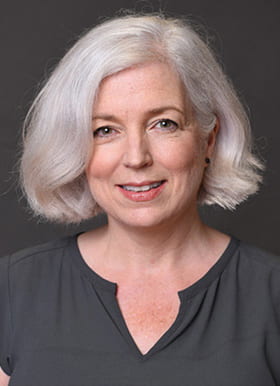When: April 12th 5:00 pm – 6:00 pm
Location: FLTC 201
Please RSVP HERE
Dr. Helen McNeill

Official Story
Helen McNeill obtained her PhD at Stanford University with James Nelson, studying how epithelial cell polarity is established, using cultured mammalian cells. She conducted her postdoctoral studies with Mike Simon (also at Stanford), using Drosophila genetics to investigate how tissues become organized, via planar cell polarity signaling. She set up her first lab at Cancer Research UK in London England, where her lab studied Fat cadherins in flies and regulation of growth via the Hippo pathway and planar polarity. She moved her lab to the Lunenfeld Research Institute in Mount Sinai Hospital and the University of Toronto in Toronto, Canada where she was Professor of Molecular Genetics, and expanded her studies to mice and hydra. In 2018, Helen moved her lab to Washington University School of Medicine, where her lab continues to study how groups of cells become organized in development. The lab uses cell biology, genetics and molecular approaches in diverse models,to understand how Fat cadherins and the Hippo pathway coordinately regulate tissue patterning and growth. Recent work in her lab has expanded to investigation of how Nemp1 regulates chromatin organization, mechanotransduction and fertility in flies, mice and humans.
Unofficial Story
I was unsure what I wanted to do as an adolescent, and was very unmotivated in high school. After graduating with mediocre grades, I went to Ireland, and worked in a local department store in the countryside for a year. Although I had a great time, I wanted to go to University. But it was too expensive for me to attend college as a non-national in Ireland. I decided to return to the US, and started college at a local school (Ramapo College), where I commuted to school from home each day, as well as working to pay for my tuition. Starting college I was first a history major, then a psychology major, then a philosophy major. I actually loved them all. But in my third year of college, I took a required “Science for non-science majors” course, and was hooked. I switched majors at the end of the class to biology, and never looked back. Ramapo was a small college with little or no research experiences available. I worked in the bio lab helping to set up for lab classes to get money for school, as my parents did not have money to pay for our education. I then worked as a year in a research lab at New York Medical College to get money and lab experience.
I started graduate school at the University of Pennsylvania in physiology. After several great rotations, I decided to join the lab of James Nelson. Six months later he decided to move to Stanford. After a lot of discussions with my husband, we decided to move to California. Grad school was exciting and we loved California. My husband asked me to not move for a postdoc, so I stayed at Stanford, but switched fields from mammalian cell biology to Drosophila development. I started my postdoc with high enthusiasm, and had been awarded an NIH and an ACS postdoctoral fellowship for my new studies. But weeks after starting I began to feel very ill— and discovered I was pregnant. I had a very rough pregnancy, with extreme nausea and was hospitalized a few times. I was unable to work for three months. Just as I was getting better, I discovered that my proposed project was scooped ( several publications in Nature), and was left with no project for my postdoc and an infant. It did not look very hopeful. Money was tight, and we juggled working and child care. I searched for a new postdoc project, and started to study a new mutant that I discovered regulated Planar cell Polarity, a relatively understudied field at the time.